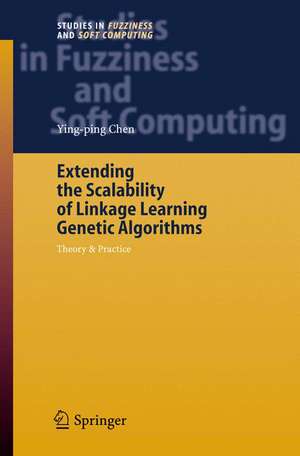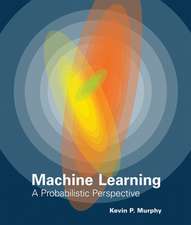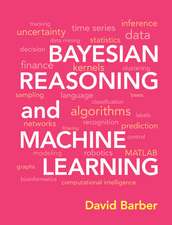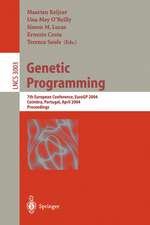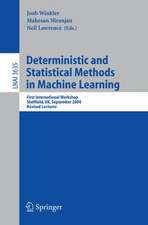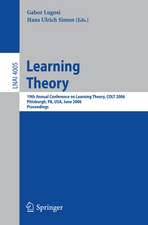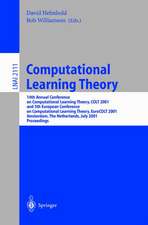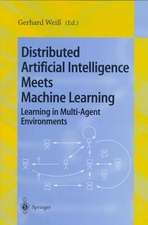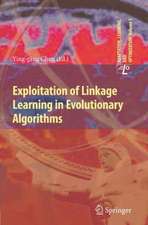Extending the Scalability of Linkage Learning Genetic Algorithms: Theory & Practice: Studies in Fuzziness and Soft Computing, cartea 190
Autor Ying-ping Chenen Limba Engleză Hardback – 6 oct 2005
| Toate formatele și edițiile | Preț | Express |
|---|---|---|
| Paperback (1) | 637.89 lei 6-8 săpt. | |
| Springer Berlin, Heidelberg – 19 noi 2010 | 637.89 lei 6-8 săpt. | |
| Hardback (1) | 644.15 lei 6-8 săpt. | |
| Springer Berlin, Heidelberg – 6 oct 2005 | 644.15 lei 6-8 săpt. |
Din seria Studies in Fuzziness and Soft Computing
- 20%
 Preț: 999.85 lei
Preț: 999.85 lei - 20%
 Preț: 653.06 lei
Preț: 653.06 lei - 20%
 Preț: 872.98 lei
Preț: 872.98 lei - 20%
 Preț: 930.57 lei
Preț: 930.57 lei - 20%
 Preț: 1051.00 lei
Preț: 1051.00 lei - 20%
 Preț: 992.44 lei
Preț: 992.44 lei - 20%
 Preț: 655.85 lei
Preț: 655.85 lei - 20%
 Preț: 1001.86 lei
Preț: 1001.86 lei - 18%
 Preț: 954.14 lei
Preț: 954.14 lei - 20%
 Preț: 330.10 lei
Preț: 330.10 lei - 20%
 Preț: 333.04 lei
Preț: 333.04 lei - 20%
 Preț: 997.56 lei
Preț: 997.56 lei -
 Preț: 391.61 lei
Preț: 391.61 lei - 20%
 Preț: 647.79 lei
Preț: 647.79 lei - 20%
 Preț: 986.01 lei
Preț: 986.01 lei - 18%
 Preț: 958.56 lei
Preț: 958.56 lei - 20%
 Preț: 996.40 lei
Preț: 996.40 lei - 20%
 Preț: 999.35 lei
Preț: 999.35 lei - 15%
 Preț: 646.43 lei
Preț: 646.43 lei - 20%
 Preț: 651.57 lei
Preț: 651.57 lei - 20%
 Preț: 997.89 lei
Preț: 997.89 lei - 15%
 Preț: 641.03 lei
Preț: 641.03 lei - 20%
 Preț: 1009.74 lei
Preț: 1009.74 lei - 20%
 Preț: 992.62 lei
Preț: 992.62 lei -
 Preț: 388.72 lei
Preț: 388.72 lei - 18%
 Preț: 1223.43 lei
Preț: 1223.43 lei - 20%
 Preț: 651.42 lei
Preț: 651.42 lei - 18%
 Preț: 951.59 lei
Preț: 951.59 lei - 18%
 Preț: 948.61 lei
Preț: 948.61 lei
Preț: 644.15 lei
Preț vechi: 805.19 lei
-20% Nou
Puncte Express: 966
Preț estimativ în valută:
123.26€ • 131.81$ • 102.77£
123.26€ • 131.81$ • 102.77£
Carte tipărită la comandă
Livrare economică 18 aprilie-02 mai
Preluare comenzi: 021 569.72.76
Specificații
ISBN-13: 9783540284598
ISBN-10: 3540284591
Pagini: 146
Ilustrații: XX, 120 p.
Dimensiuni: 155 x 235 x 14 mm
Greutate: 0.38 kg
Ediția:2006
Editura: Springer Berlin, Heidelberg
Colecția Springer
Seria Studies in Fuzziness and Soft Computing
Locul publicării:Berlin, Heidelberg, Germany
ISBN-10: 3540284591
Pagini: 146
Ilustrații: XX, 120 p.
Dimensiuni: 155 x 235 x 14 mm
Greutate: 0.38 kg
Ediția:2006
Editura: Springer Berlin, Heidelberg
Colecția Springer
Seria Studies in Fuzziness and Soft Computing
Locul publicării:Berlin, Heidelberg, Germany
Public țintă
ResearchCuprins
Introduction.- Genetic Algorithms and Genetic Linkage.- Genetic Linkage Learning Techniques .- Linkage Learning Genetic Algorithm.- Preliminaries: Assumptions and the Test Problem.- A First Improvement: Using Promoters.- Convergence Time for the Linkage Learning Genetic Algorithm.-Introducing Subchromosome Representations.- Conclusions.
Textul de pe ultima copertă
Genetic algorithms (GAs) are powerful search techniques based on principles of evolution and widely applied to solve problems in many disciplines.
However, unable to learn linkage among genes, most GAs employed in practice nowadays suffer from the linkage problem, which refers to the need of appropriately arranging or adaptively ordering the genes on chromosomes during the evolutionary process. These GAs require their users to possess prior domain knowledge of the problem such that the genes on chromosomes can be correctly arranged in advance. One way to alleviate the burden of GA users is to make the algorithm capable of adapting and learning genetic linkage by itself.
In order to tackle the linkage problem, the linkage learning genetic algorithm (LLGA) was proposed using a unique combination of the (gene number, allele) coding scheme and an exchange crossover to permit GAs to learn tight linkage of building blocks through a special probabilistic expression. While the LLGA performs much better on badly scaled problems than simple GAs, it does not work well on uniformly scaled problems as other competent GAs. Therefore, we need to understand why it is so and need to know how to design a better LLGA or whether there are certain limits of such a linkage learning process.
This book aims to gain better understanding of the LLGA in theory and to improve the LLGA's performance in practice. It starts with a survey and classification of the existing genetic linkage learning techniques and describes the steps and approaches taken to tackle the research topics, including using promoters, developing the convergence time model, and adopting subchromosomes. It also provides the experimental results for observation of the linkage learning process as well as for verification of the theoretical models proposed in this study.
However, unable to learn linkage among genes, most GAs employed in practice nowadays suffer from the linkage problem, which refers to the need of appropriately arranging or adaptively ordering the genes on chromosomes during the evolutionary process. These GAs require their users to possess prior domain knowledge of the problem such that the genes on chromosomes can be correctly arranged in advance. One way to alleviate the burden of GA users is to make the algorithm capable of adapting and learning genetic linkage by itself.
In order to tackle the linkage problem, the linkage learning genetic algorithm (LLGA) was proposed using a unique combination of the (gene number, allele) coding scheme and an exchange crossover to permit GAs to learn tight linkage of building blocks through a special probabilistic expression. While the LLGA performs much better on badly scaled problems than simple GAs, it does not work well on uniformly scaled problems as other competent GAs. Therefore, we need to understand why it is so and need to know how to design a better LLGA or whether there are certain limits of such a linkage learning process.
This book aims to gain better understanding of the LLGA in theory and to improve the LLGA's performance in practice. It starts with a survey and classification of the existing genetic linkage learning techniques and describes the steps and approaches taken to tackle the research topics, including using promoters, developing the convergence time model, and adopting subchromosomes. It also provides the experimental results for observation of the linkage learning process as well as for verification of the theoretical models proposed in this study.
Caracteristici
Advances our understanding of the linkage learning genetic algorithm and demonstrates potential research directions Includes supplementary material: sn.pub/extras
